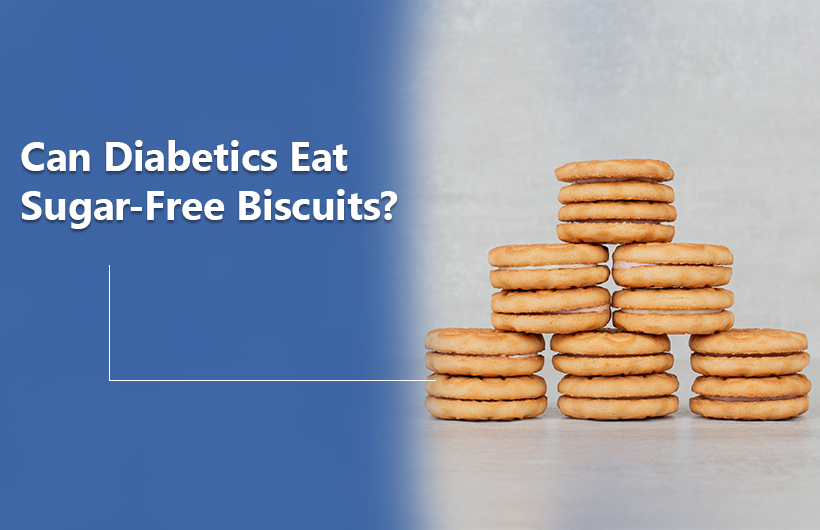Managing diabetes requires consistent attention to food choices, especially when it comes to snacks and sweets. One common question many diabetic individuals and their caregivers ask is Can diabetics eat sugar-free biscuits?
With the rising popularity of sugar-free snacks, sugar-free biscuits are often marketed as a safe indulgence for those watching their blood sugar. But are they safe, and do they offer any nutritional value? Let’s explore the facts behind sugar-free biscuits and whether they truly fit into a diabetic-friendly lifestyle.
What Are Sugar-Free Biscuits?
Sugar-free biscuits are versions of regular biscuits made without traditional sugar. Instead of sucrose (table sugar), they are sweetened using alternatives like:
- Stevia
- Sucralose
- Erythritol
- Aspartame
- Maltitol
These sweeteners don’t cause a spike in blood sugar like regular sugar does, making them appear to be a good choice for diabetics. However, just because these biscuits are labelled “sugar-free” doesn’t mean they’re free from all health concerns.
While sugar-free biscuits eliminate added sugar, many still contain refined flours, fats, and starches that contribute to carbohydrate load, which can still affect blood sugar levels.

Can Diabetics Eat Sugar-Free Biscuits?
This is the central question: Can people with diabetes eat sugar-free biscuits? The short answer is yes, but with caution.
Although sugar-free biscuits don’t contain sugar, they often still have:
- Carbohydrates from refined flour or starch
- Fats — including unhealthy saturated fats
- Calories — which can lead to weight gain if overconsumed
These factors can still affect blood glucose levels, insulin sensitivity, and overall diabetes management.
For this reason, sugar-free biscuits should be consumed in moderation. Always consider:
- Portion control — stick to 1–2 biscuits, not the whole pack
- Timing — avoid snacking late at night
- Monitoring — check your blood sugar levels after eating
The key is to enjoy them occasionally and in small amounts, not as a daily staple.
Are Sugar-Free Biscuits Good for Diabetics?
Let’s take a closer look — are sugar-free biscuits good for diabetics? They do have some benefits, but they’re not without drawbacks.
Good Things:
- No added sugar – which helps reduce sudden spikes in blood sugar
- Convenient – easy to carry and use as an occasional snack
- Widely available – you’ll find them in most supermarkets and pharmacies
Bad Things:
- Hidden carbs – many brands still use maida (refined flour), which increases glycemic load
- Artificial sweeteners – some may cause digestive discomfort or raise health concerns with regular use
- Overconsumption risk – the label “sugar-free” can mislead people into eating too much
In essence, sugar-free doesn’t always mean healthy. It’s important to check the overall nutrition profile rather than rely on one label claim.
What to Look in a Diabetic-Friendly Biscuit
If you’re planning to include sugar-free biscuits in your diet occasionally, here’s what to keep in mind:
- Check the Nutritional Label
- Look at the carbohydrate content per serving
- Check for added fats, especially saturated and trans fats
- Look for High-Fibre, Low-Carb Options
- Fibre helps reduce blood sugar spikes and keeps you full longer
- Biscuits made with whole grains, oats, or millet are better choices
- Avoid Additives and Preservatives
- Many packaged foods contain chemicals to improve shelf life, which is not ideal for long-term health
- Go for Natural Sweeteners
- If possible, choose products made with stevia or monk fruit, which are safer natural alternatives
Reading labels and understanding ingredients can make a huge difference in your journey with diabetes.
Expert Advice: Moderation Is Key
Even when you choose a seemingly safe option like sugar-free biscuits, it’s essential to consult with your Diabetes Specialist or dietician. Every diabetic individual has a different response to foods, depending on their:
- Medication
- Blood sugar levels
- Weight
- Activity level
- Comorbid conditions
A healthcare professional can help decide whether sugar-free biscuits fit into your meal plan or suggest better alternatives.
Remember, no packaged snack should replace a nutrient-dense diet filled with fresh fruits, vegetables, whole grains, lean proteins, and healthy fats.
Conclusion
To wrap up, can diabetics eat sugar free biscuits? Yes, but only occasionally and in small amounts. They can be a useful snack when chosen carefully, but they should never be treated as guilt-free, unlimited indulgence.
Sugar-free doesn’t mean carb-free or calorie-free. It’s vital to look beyond marketing labels and understand the ingredients and nutrition facts.
A balanced, wholesome diet and consistent blood sugar monitoring remain the cornerstones of diabetes management. For personalized guidance and expert care, consult Diabetes Specialist Dr. Moxit Shah.
FAQs
Can diabetics eat sugar-free biscuits daily?
It’s not recommended to eat sugar-free biscuits every day. They should be consumed occasionally and in controlled portions to avoid hidden carbs and additives.
Are sugar-free biscuits better than regular biscuits for diabetics?
Yes, in terms of sugar content, they are better. But they can still contain refined flour and fats that may affect blood sugar.
Which sugar-free sweetener is safest for diabetics?
Stevia and monk fruit extract are considered the safest natural options. Avoid overuse of artificial sweeteners like aspartame or saccharin.
What is the best time for diabetics to eat sugar-free biscuits?
They can be consumed as a mid-morning or evening snack, ideally with a source of protein to avoid blood sugar spikes.
Are all sugar-free biscuits diabetic-friendly?
No. Not all sugar-free biscuits are suitable for diabetics. Always check the ingredients, carbs, and fat content before choosing a brand.






